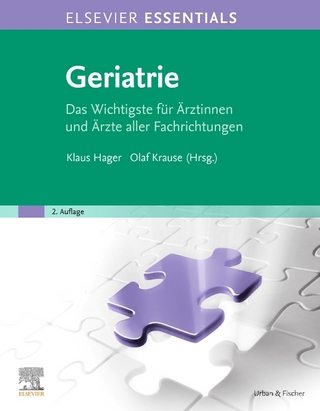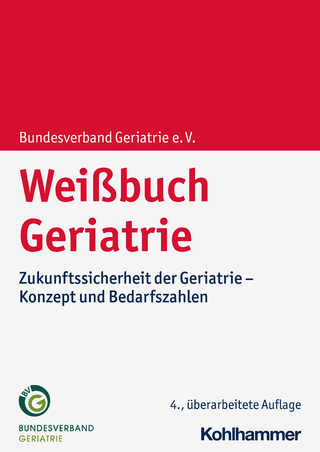
Management of Non-Muscle Invasive Bladder Cancer
Springer International Publishing (Verlag)
978-3-030-28648-4 (ISBN)
Management of Non-Muscle Invasive Bladder Cancer features detailed guidance in uniformly formatted chapters on how to properly apply a range of available therapeutic treatments relevant for patient care.
This book covers the latest advances in non-muscle invasive bladder cancer care. It provides a review of the available evidence base for the efficacy of a range of therapeutic techniques, diagnostic procedures and risk factors.
Management of Non-Muscle Invasive Bladder Cancer features detailed guidance in uniformly formatted chapters on how to properly apply a range of available therapeutic treatments relevant for patient care. It is a valuable resource for all trainee and practising medical professionals who treat these patients.
Sanchia Goonewardene qualified from Birmingham Medical School with Honours in Clinical Science and a B.Med.Sc. degree in Medical Genetics and Molecular Medicine. She has a specific interest in academia during her spare time, with over 530 publications to her name with 2 papers as a number 1 most cited in fields (Biomedical Library) and has significantly contributed to the Urological Academic World-she has since added a section to the European Association of Urology Congress on Prostate Cancer Survivorship and Supportive Care and is an associate member of an EAU Guidelines Panel on Chronic Pelvic Pain. She has been the UK lead in an EAU-led study on Salvage Prostatectomy. She has also contributed to the BURST IDENTIFY study as a collaborator. Her background with research entails an M.Phil., the work which was drawn up as a document for PCUK then, NICE endorsed. She gained funding from the Wellcome Trust for her research elective. She is also an Alumnus of the Urology Foundation, who sponsored a trip to USANZ trainee week. She also has 3 books published - Core Surgical Procedures for Urology Trainees (7794 downloads), Prostate Cancer Survivorship (4,000 downloads) and her third book, Basic Urological Management (8,158 downloads). She has supervised her 1st thesis with Kings College London and Guys Hospital (B.Med.Sci. degree which went on to gain 1st class, students' thesis score 95%). Recently, she has gained her first Associate Editor position with the Journal of Robotic Surgery. She is an editorial board member of the World Journal of Urology and was invited to be Guest Editor for a Special Issue on Salvage Therapy in Prostate Cancer. She is also a review board member for BMJ Case Reports. Additionally, she is on the International Continence Society Panel on Pelvic Floor Dysfunction, ICS abstract reviewer, and has been an EPoster Chair at ICS. She has also chaired semi-live surgery at ERUS and presented her work as part of the Young Academic Urology Section at ERUS. Prof. Raj Persad, M.B.B.S. M.D. F.R.C.S. (Urol) F.E.B.U., is a research active academic urologist who has been at the forefront of surgical uro-oncology innovation and research for over 25 years. His achievements include over 250 peer-reviewed papers, 5 books and GBP6m in research grants and awards. He is/has been chief investigator for major portfolio clinical trials, and his research programmes range from translational laboratory biomarkers studies to medical robotics innovation. He has had editorial positions with mainline urology and medical journals and is/has been on international and national cancer guidelines committees including CRUK and NICE. One of his passions is surgical training both home and abroad, and he has taught, examined and trained surgeons in Africa, the Caribbean and Eastern Europe. Mr Motiwala is well known to the community worldwide. He was a Professor of Urology in India and has also served as an FRCS Urol Examiner. He has been training programme director for the London Deanery, Imperial Rotation, and was well-liked by all of his trainees. He has also been a Lecturer for Institute of Urology and Oxford Trainees. He has over 25 years' experience as a Consultant in urology and extensive exposure to senior leadership roles within healthcare provision and professional institutions including Chairman of the surgical division at Wexham Park Hospital. He also has a strong track record of achieving clinical targets within tightly controlled budgets, developing innovative strategies to improve patient care and optimise use of resources, for which he received a Bronze Award. He is a dedicated and committed surgeon, utilising teaching, surgical and medical skills for the greater good through international voluntary work, building capability and skills in reconstructive surgery in India and Africa. He was conferred a position as a Visiting Professor - University of Khartoum, Sudan, 2009, in recognition of voluntary work in Sudan, conducting final Urology Examinations to train qualified surgeons, providing training to surgeons in reconstruction and carrying out complex surgery. Dr. David M. Albala graduated with a geology degree from Lafayette College in Easton, Pennsylvania. He completed his medical school training at Michigan State University and went on to complete his surgical residency at the Dartmouth-Hitchcock Medical Center. Following this, Dr. Albala was an endourology fellow at Washington University Medical Center under the direction of Ralph V. Clayman. He practised at Loyola University Medical Center in Chicago and rose from the ranks of Instructor to a Full Professor in Urology and Radiology in eight years. After 10 years, he became a Tenured Professor at Duke University Medical Center in North Carolina. At Duke, he was Co-Director of the Endourology Fellowship and Director for the Center of Minimally Invasive and Robotic Urological Surgery. He has over 150 publications in peer-reviewed journals and has authored three textbooks in endourology and one in general urology.
Bladder cancer survivorship.- Survivor burdens unmet needs.- CPEX testing in bladder cancer.- Management of low, intermediate and high risk bladder cancer.- Neoadjuvant chemotherapy in muscle invasive bladder cancer.- Multimodal therapy for muscle invasive bladder cancer .- None Muscle invasive bladder cancer- chemotherapy or resection.- Muscle invasive bladder cancer- open, laparoscopic or roboticG3 NMIBC- BCG versus cystectomy.- Role of immunotherapy in bladder cancer .- Robotic Surgery and bladder cancer.- Quality of life post Cystectomy.- The Neobladder and Quality of life.- Ileal conduit versus neobladder, which is better?.- Quality of life post NMIBC or BCG.- Rarc technical tips and tricks.- Robotic Surgery and resection.- Robotic radical cystectomy and PLND.- Robotic cystectomy and sentinal node mapping.- Robotic cystectomy and neobladder formation.- Robotic cystectomy and enhanced recovery.- Robotic radical cystectomy, pain and enhanced recovery.- Enhanced recovery and hypoalbumineamia.- The Robotic approach to redo surgery.- Robotic cystectomy and ureteric strictures.- BCG and cystectomy.- BCG and secondary malignancy.
| Erscheinungsdatum | 06.11.2020 |
|---|---|
| Zusatzinfo | XXIV, 402 p. 20 illus., 19 illus. in color. |
| Verlagsort | Cham |
| Sprache | englisch |
| Maße | 155 x 235 mm |
| Gewicht | 652 g |
| Themenwelt | Medizin / Pharmazie ► Medizinische Fachgebiete ► Geriatrie |
| Medizin / Pharmazie ► Medizinische Fachgebiete ► Onkologie | |
| Medizin / Pharmazie ► Medizinische Fachgebiete ► Urologie | |
| Schlagworte | CPEX testing • Cystectomy • Hypoalbumineamia • Ileal conduit • Sentinal node |
| ISBN-10 | 3-030-28648-7 / 3030286487 |
| ISBN-13 | 978-3-030-28648-4 / 9783030286484 |
| Zustand | Neuware |
| Haben Sie eine Frage zum Produkt? |
aus dem Bereich


